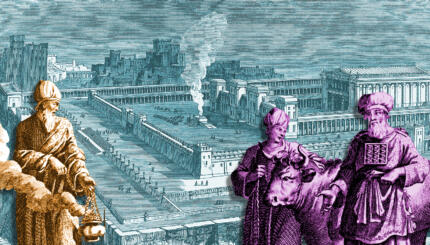All the minor public fasts begin at sunrise and conclude the same day at sunset (which is marked by the appearance of the first three stars in the sky). Aside from fasting itself, many of the stringent restrictions that apply on the fasts of Tisha B’Av (the Ninth of Av) and Yom Kippur (the Day of Atonement) do not apply to the minor fasts, including refraining from bathing and wearing leather.
The four minor fasts are: Shiva Asar be-Tammuz, the 17th of Tammuz, the date the Romans breached Jerusalem walls; Asarah beTevet, the 10th of Tevet, the beginning of the siege of Jerusalem by the Babylonians; Tzom Gedaliah, the fast of Gedaliah, which falls on the third of Tishrei, the date a Babylonian governor of Judah was killed; and Ta’anit Esther–the fast of Esther–the 13th of Adar, which is the day before Purim.
What Are the Restrictions?
On minor fasts, the regulations are looser, and thus pregnant women, nursing mothers, and the sick are exempt from fasting. Nevertheless, every one–including those exempt from fasting–are discouraged from indulging in unnecessary pleasures. Even those exempt from fasting are discouraged from regular meals or taking more food than is necessary. The purpose of the fast is to meditate on the meaning of the day and examine one’s own sins.
Changes in Liturgy
On these fast days there are a number of additions to the regular daily service and a few variations in the liturgy. Avinu Malkeinu (“Our Father, Our King”) is recited after the Amidah at the morning and afternoon services. In some traditions, special selihot (prayers of forgiveness) are added. The same section of the Torah is read during both morning and afternoon services. It is chanted with High Holiday cantillation in order to remind the congregation that fast days call for repentance and good deeds. The reading starts with Exodus 32:11-14, and then the reader skips to Exodus 34:1-10. These sections deal with God’s 13 qualities of mercy and God’s forgiveness of the pious. Traditionally, some of the lines–Exodus 32:12, 34:6, and 34:9–are read aloud by the congregation, followed by the reader, because these lines, in particular, speak of God’s mercy and willingness to forgive.
With your help, My Jewish Learning can provide endless opportunities for learning, connection and discovery.
During the afternoon service, a haftarah (prophetic reading) from Isaiah 55:6-56:8 is read by the Ashkenazim (Jews of Eastern European descent). It also deals with repentance and God’s forgiveness, the redemption of Israel and the world. The Sephardim (Jews of Mediterranean descent) do not read a haftarah on the afternoon of a fast day, except for Tisha B’Av.
None of the four minor fasts may be observed on a Shabbat, which is a day of joy and celebration. Only the major fast of Yom Kippur may take place on Shabbat. If any of the above-mentioned dates falls on Shabbat, the fast is postponed until Sunday. If Purim falls on a Sunday, the Fast of Esther is observed on the preceding Thursday. Fasts that fall on Friday follow the normal practices for the fast. However, this could really only apply to the 10th of Tevet because the arrangement of the calendar does not permit any of the other fasts to occur on Friday.
Rituals
Among the very few rituals to be followed on a minor fast day is the tradition of giving charity, especially food necessary for the evening meal (Talmud, Sanhedrin 35a). The notion behind this practice is found in the Talmud, which states that the reward of a fast day is in the amount of charity distributed (Berakhot 6b).
It is important to note that Reform Jews traditionally only fasted on Yom Kippur, and the other fast days were only vaguely known or observed among Reform Jews. The reasons for this included a distinctive approach to Jewish tradition and halacha (Jewish law), and as an ambivalent attitude toward commemoration of the destruction of the Temple and hopes for its restoration. There has in recent years been a renewed attention toward the major fast day of Tisha B’Av, although the minor fasts continue not to play an important role in Reform observance.
Purim
Pronounced: PUR-im, the Feast of Lots, Origin: Hebrew, a joyous holiday that recounts the saving of the Jews from a threatened massacre during the Persian period.
Tevet
Pronounced: TEH-vut, Origin: Hebrew, Jewish month usually coinciding with December-January
Yom Kippur
Pronounced: yohm KIPP-er, also yohm kee-PORE, Origin: Hebrew, The Day of Atonement, the holiest day on the Jewish calendar and, with Rosh Hashanah, one of the High Holidays.
halacha
Pronounced: hah-lah-KHAH or huh-LUKH-uh, Origin: Hebrew, Jewish law.



